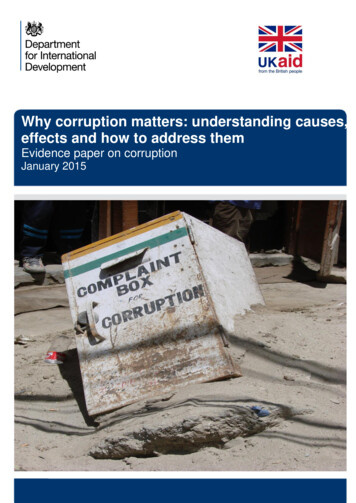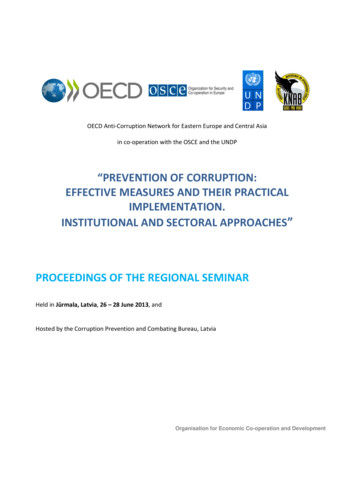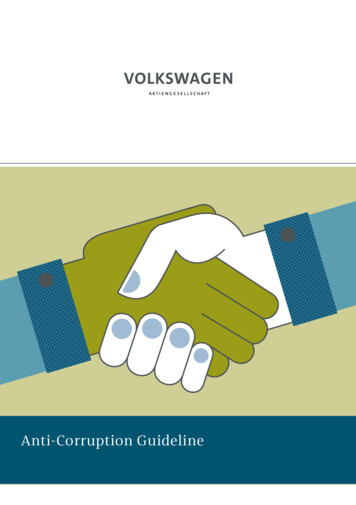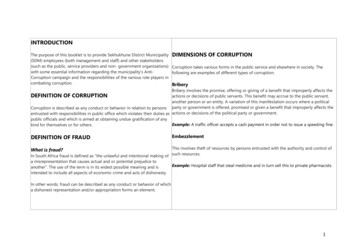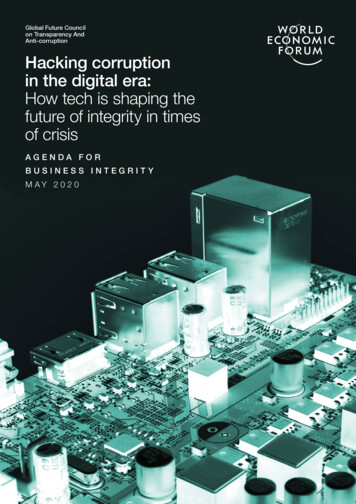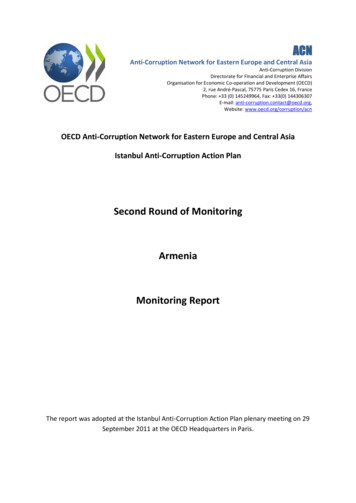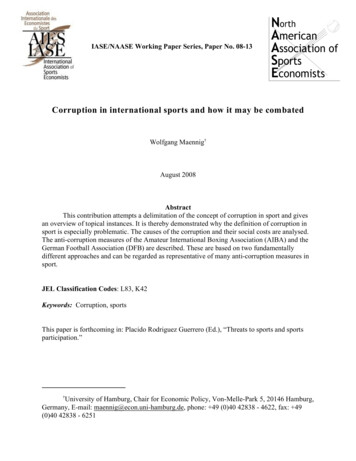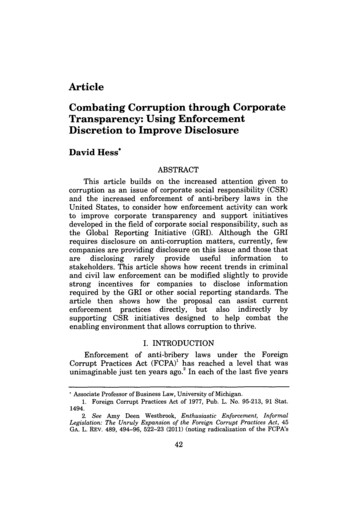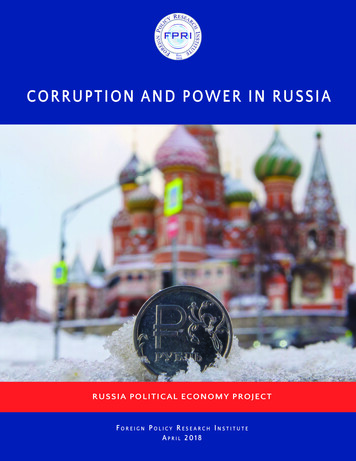
Transcription
Russia Political Economy ProjectCORRUPTION AND POWER IN RUSSIARUSSIA POLITICAL ECONOMY PROJECTForeign Policy Research InstituteApril 20181
The Foreign Policy Research Institute thanks the Carnegie Corporation for its support of the RussiaPolitical Economy Project.All rights reserved. Printed in the United States of America. No part of this publication may bereproduced or transmitted in any form or by any means, electronic or mechanical, includingphotocopy, recording, or any information storage and retrieval system, without permission inwriting from the publisher. 2018 by the Foreign Policy Research InstituteCOVER: A coin worth one ruble against the background of St. Basil’s Cathedral in Moscow, AdobeStock.
Foreign Policy Research InstituteMissionThe Foreign Policy Research Institute is dedicated to bringing the insights of scholarship to bearon the foreign policy and national security challenges facing the United States. It seeks to educatethe public, teach teachers, train students, and offer ideas to advance U.S. national interests basedon a nonpartisan, geopolitical perspective that illuminates contemporary international affairsthrough the lens of history, geography, and culture.Educating the American Public: FPRI was founded on the premise than an informed and educatedcitizenry is paramount for the U.S. to conduct a coherent foreign policy. Today, we live in a worldof unprecedented complexity and ever-changing threats, and as we make decisions regardingthe nation’s foreign policy, the stakes could not be higher. FPRI offers insights to help the publicunderstand this volatile world by publishing research, hosting conferences, and holding dozensof public events and lectures each year.Preparing Teachers: Unique among think tanks, FPRI offers professional development for high schoolteachers through its Madeleine and W.W. Keen Butcher History Institute, a series of intensiveweekend-long conferences on selected topics in U.S. and world history and internationalrelations. These nationally known programs equip educators to bring lessons of a new richnessto students across the nation.Training the Next Generation: At FPRI, we are proud to have played a role in providing students– whether in high school, college, or graduate school – with a start in the fields of internationalrelations, policy analysis, and public service. Summer interns – and interns throughout the year –gain experience in research, editing, writing, public speaking, and critical thinking.Offering Ideas: We count among our ranks over 120 affiliated scholars located throughout thenation and the world. They are open-minded, ruthlessly honest, and proudly independent. In thepast year, they have appeared in well over 100 different media venues- locally, nationally andinternationally.
ABOUT THE AUTHORNoah Buckley is a postdoctoral researcher at New YorkUniversity Abu Dhabi and research fellow at the InternationalCenter for the Study of Institutions and Development at theHigher School of Economics. His research encompassesauthoritarian politics, post-communist political economy,elite and regional politics in Russia, and corruption.Before joining NYU Abu Dhabi, Noah received his Ph.D. inpolitical science from Columbia University with focuses oncomparative politics and quantitative methodology. Hisin-progress book project, based on his dissertation, usesan extensive new dataset to uncover the salutary effectsthat political competition has on the levels of corruptionthat ordinary Russians experience.
Corruption and Power in Post-Communist RussiaExecutive SummaryNoah BuckleyCorruption has been a constant factor in Russia’s political economy. From one era toanother, the multifarious forms of corruption continue to pervade Russian politics despitesincere and insincere efforts to fight it. The election of Vladimir Putin as president in 2000brought a new effort at consolidating and organizing authority in the country. However,far from eliminating corruption, politics of the Putin era have merely changed the form ofcorruption, integrating corruption into the “power vertical” through which Putin governs.In recent years, corruption has played an ever larger role in the regime’s stability. It servesas a force to co-opt and control the political elite and to replace formal institutions withsomething more flexible and more amenable to the needs of a consolidated authoritarianregime. Only deep changes, such as higher levels of political competition, have a chanceof reducing corruption in the long run. The approaching fourth term of President Putin willcontinue to increase the role of informal institutions in Russian politics, in which corruptionplays an increasingly large role in the Kremlin’s management of the political process.1Foreign Policy Research Institute
Russia Political Economy ProjectThe Role of Corruption in RussiaFrom Leo Tolstoy’s novels to the moderntabloid, it is difficult to read about Russiawithout confronting corruption. In 2016,Transparency International ranked Russia131st in its Corruption Perceptions Index(CPI), placing the country in the unseemlycompany of countries such as Guatemalaand Nigeria (see Figure 1). While nearlyevery society faces some amount ofcorruption, it is rare to find a nationthat has incorporated corruption intoits collective consciousness as deeplyas Russia. Any attempt to understandRussia’s political economy must considercorruption in all its forms. Graft—includingall forms of overt and covert corruption,from a bribe paid to a scowling trafficcop to a suitcase of euros handed off ina Moscow club—has evolved along withpost-Soviet Russia itself. Understandingthe phenomenon and the role it plays inpolitics and economics is crucial.But what is corruption in Vladimir Putin’sRussia? Who engages in it, what sumsare involved, and what are its variousforms? A crude distinction should beFigure 1: Transparency International Corruption Perceptions Index for 20162
Figure 2: Proportion of respondents who report having had to give a bribe in the following situationsSituation in which bribe was givenJul’00 Feb’05 Jan’07 Apr’10 Jan’12Jan’13 Feb’15 Feb’16 Mar’17Spending time in the hospital13%8%9%10%9%10%9%7%9%Breaking traffic rules and beingdetained by the traffic police6%8%8%8%9%7%6%7%6%Acquiring a driver’s license,registering a vehicle, passing vehicleinspection3%5%4%6%5%5%6%6%5%Getting a child into school3%2%1%3%3%2%2%2%3%Getting into higher education5%4%3%3%3%2%3%3%2%Acquiring important documentsfrom local authorities-4%3%3%2%2%2%3%2%Getting a job6%3%2%4%3%2%3%2%2%made between “grand” corruption and“petty” corruption. The former oftenentails substantial payments frombusinesses or interest groups to highranking government officials. The latteris the venality that everyday Russiansencounter—payments during traffic stopsor permit applications. Each form hasdistinct causes and dynamics, but bothtypes of corruption increase economicinefficiencies, distort the political system,and decrease state legitimacy. After all,neither investors nor citizens are likely totrust a highly corrupt state apparatus.3As Figure 2 shows, raw levels of reportedcorruption are sizeable and have beenstable over time. Other survey evidenceon bribery in general indicates thatabout 15-25% of Russians report havinghad to give a bribe in the last year.Bribes are given for mundane tasks likereceiving medical care or getting drivingdocuments. Petty corruption remainsdistressingly common in Russia—and ithas been for some time.Foreign Policy Research Institute
Russia Political Economy ProjectEndnotes1 “Corruption Perceptions Index 2016,” Transparency International, January 25, 2017, on perceptions index 2016.2 “Corruption and Bribetaking in Russia,” January 15, 2015, http://fom.ru/Bezopasnost-i-pravo/11912;and Noah Buckley and Timothy Frye, “Of Bribes and Badges in Russia: Does Paying a Bribe UndermineTrust in Government?” Unpublished manuscript, presented at the Midwest Political ScienceAssociation conference, 2012.”3 “Corruption,” Levada Center, April 21, 2017, https://www.levada.ru/en/2017/04/21/corruption/.4
Corruption Throughout Russian HistoryThroughouthistory, Russian officialshave extracted bribes no matter theirtitles: from the geroldmeistery of theRussian Empire to the kommissarsof Soviet Russia to today’s deputyhealth inspectors. In the imperial era,some officials viewed corruption asan inevitable means of supplementingmeager salaries.1 Bribes were often inkind, such as a gift of English whiskey toa customs officer or a fine dinner for askeptical judge. In fact, a rich vocabularyarose to describe different forms of“donations” that could be made to curryfavor with officials: from vziatki andposuly to pochesti. Russia’s modernizingtsars often sought to ban such practices,while those more inclined towardstability grudgingly allowed them.After the Soviets established a socialistcommand economy, venality continuedto pervade many aspects of the regime.2Though carefully hidden from publicview, the phenomenon was particularlywidespread in the early decades ofSoviet power. For example, the Politburoarrested and tried some members of theSoviet Supreme Court for bribery in 1948.3Strict party control over a totalitarianbureaucracy meant that officials had todevise less overt strategies of personalgain. Bribery often took a non-cash form.Gifting scarce goods, trading personal5influence (blat), and other informalpractices were common among lessscrupulous officials. The punishmentfor engaging in such anti-communistbehavior when discovered was severe.Officials were fired, ejected from theCommunist Party, and often sentencedto lengthy prison terms.4In the late 1980s, as Mikhail g the Soviet political economy,new opportunities for private gainappeared. This trend coincided with agrowing sense that stagnation and the slowrot of corruption plagued the communistenterprise during the late Leonid Brezhnevand gerontocracy era. Well-intentionedtolerance for entrepreneurship, profit,market mechanisms, and non-stateorganization far outpaced the ability ofSoviet authorities to regulate or evencomprehend the changes taking place.From this environment arose Russia’s firstoligarchs, whose roots in the Komsomoland Soviet economy combined to yieldgreat influence. Corruption, extortion,black markets, and criminality flourishedas a result.The Wild ‘90sAfter the USSR collapsed, the collapse ofthe state economy and the emergenceof new, private firms brought forth yetForeign Policy Research Institute
Russia Political Economy Projectnew types of corruption. Fiscal shortfalls,political inexperience, and bureaucraticinertia chronically weakened the stateapparatus. Organized crime, unscrupulousbusinessmen, and government officials—desperate for funds to supplement theirvanishingsalaries—foundcommoninterests. The distinction between themalfeasance of state actors, especiallythe security services, and organizedcrime faded. Officials demanded bribesto get anything done, while mafia bossesextorted business owners trying to avoidtrouble.5 Perceptions of the prevalenceof corruption, both among the broaderpublic and within the businesscommunity, skyrocketed.But just how unexpected was thecorruption that Russia experienced inthe 1990s? Some scholars have arguedthat this experience was “normal”given Russia’s level of economicdevelopment.6 They asserted that it wasdifficult to expect a country with nearlyno experience with democracy, liberalmarket institutions, private ownership, orfinancial governance to do any better. Asthe country grows, gains expertise, andintegrates into the global community,these difficulties should fade. Figure 4shows that these trends have not come topass—corruption worsened or remainedhigh in Russia from the late 1980s to early2000s, while it improved in countriesthat were in comparable circumstances.What is more, while the “normaldevelopment” line of thinking is quiteattractive, it understates the fundamentalFigure 3: Number of Recorded Offences Committed by Officials in 5199619971998199920002001Abuse of powerNote: Data on “abuse of power” is not available for 1995-20016
Figure 4: Corruption Perceptions Index for Selected Countries (10 highly clean, 0 highly corrupt)81980- 19881985 epublicRankingHungary 031/9133/1022.12.32.779/9171/10231/54 34/54 34/54 30/52 39/85 38/99 39/903.65.25.65.14.64.240/54 27/54 24/54 29/52 39/85 44/995.15.25.45.24.84.627/54 27/54 25/54 27/52 37/85 39/99 42/901.65.24.95.255.246/54 26/54 31/54 28/52 33/85 31/995.13.32.62.32.42.427/54 39/54 48/54 49/54 49/54 76/85 82/90role that corruption has come to play inRussia. It is not a question of bad eggs,low state capacity, or criminal pockets ingovernment, as it often is in other, moredeveloped contexts. Rather, corruptionis not dying out in Russia because it hasbecome essential to how politics andgovernance work.7Foreign Policy Research Institute
Russia Political Economy ProjectEndnotes1 For a quantitative study of the meaning and implementation of corruption in Imperial Russia, see,E.S. Korchmina, “Do not give bribes in honor: Pochest and vziatka in post-Petrine Russia,” RossiiskaiaIstoriia, vol. 2 (2015), pp. 3-13.2 For descriptions of corruption and other elements of the Soviet “second economy,” see, FerdinandFeldbrugge, “Government and shadow economy in the Soviet Union,” Soviet Studies, vol. 36 no. 4(1984), pp. 528-543; and Gregory Grossman,“Price Control, Incentives, and Innovation in the SovietEconomy,” The Socialist price mechanism (1977), pp. 129-169.3 “Prestupnaya deyatel'nost' sudebnykh rabotnikov [Criminal activity of judicial workers],” Kommersant,November 11, 2009, https://www.kommersant.ru/doc/1269865.4 Andrei Borovoy and Olga Ilyina, “Korruptsiya v SSSR: 7 gromkikh ugolovnykh del [Corruption inthe USSR: 7 high-profile criminal cases],” Pervoye Antikorruptsionnoye SMI, August 26, 2013, https://pasmi.ru/archive/95250/.5 Vadim Volkov, “Violent entrepreneurship in post-communist Russia,” Europe-Asia Studies, vol. 51no. 5 (1999), pp. 741-754.6 Andrei Shleifer and Daniel Treisman, “A Normal Country: Russia after Communism,” Journal ofEconomic Perspectives vol. 19, no. 1 (2005), pp. 151-174.7 Manabu Suhara, “Corruption in Russia: A Historical Perspective” (Manuscript, 2004).8 Manabu Suhara, “Corruption in Russia: A Historical Perspective” (Manuscript, 2004).8
Introducing the Power VerticalIn 1999, President Boris Yeltsin surprisedRussians by resigning on New Year’s Eve,making little-known bureaucrat VladimirPutin the president of the RussianFederation. Putin wasted little time inreestablishing state authority. Frustratedby central government weaknessin the 1990s, Putin moved againstoligarchs, organized crime bosses, andregional politicians who threatenedcentral control. Though he talkedtough about eradicating corruption,it merely morphed into new forms.In many ways, Putin simply sought to bringorder to Russian corruption. Explicitly orimplicitly, he forced malfeasance intothe constraints of the newly establishedpower vertical. New rules of the gameappeared, and elites had to demonstratetheir willingness to play by these rules.Mikhail Khodorkovsky was the mostprominent oligarch who challengedthe vertical’s political code by buildingalternative centers of power. He strayedtoo far into politics by funding civil societygroups and hinting at political ambitions,and was imprisoned for a decade as aresult. By the mid-2000s, a new politicalrule had emerged: enrich those aboveyou in the vertical and maintain yourloyalty as you work to enrich yourself.Manifestations of Corruption in Putin’sRussiaThe process of corruption being molded9into the power vertical caused graft tomorph into severalBy the midnew forms. The firstform is the use of 1990s, a newpolitical rulestateprocurementpractices to steal had emerged:fundsfromtheenrich thosegovernmentvia above you inoverpriced contracts.the verticalThe current processforprocurement, and mantaine s t a b l i s h e dyour loyaltyinthe2000s,as you workoffersnumerousto enrichopportunities for theft.yourself.Auctions are eitherhastilyannouncedor not publicized at all; bidders arebarred on technicalities; and bids aremanipulated to give an unfair advantageto insiders. The result is a vast systemof corruption that benefits thoseconnected to the regime with kickbacks,fraudulent contracts, shoddily producedoutputslikepoorlyconstructedroads that quickly disintegrate, andother forms of ill-gotten winnings.The 2014 Winter Olympic Gamesin Sochi offer an enlightening, ifuncharacteristically large-scale, example.Opposition politician Boris Nemtsov—who was later assassinated just outsidethe Kremlin’s walls—and his colleaguespublished an examination of graft thatdetailed the egregious overspending ontransport infrastructure in preparationForeign Policy Research Institute
Russia Political Economy Projectfor the Games.1 Highways connectingOlympic venues were budgeted at over 140 million per kilometer, easily twicethe standard international cost. In sum,the authors allege that over 30 billionwas stolen from Sochi’s bloated budget.Substantial portions went to companiesrun by oligarchs with close personalconnections to Putin, such as Arkadyand Boris Rotenbergs’ StroyGazMontazh.The second prominent method ofconcealing systematized corruptionutilizes complex asset ownership deals.The renationalization of the economy’scommanding heights under Putin,such as the centralization of much ofRussia’s oil and gas production intoGazprom and Rosneft, created amplespace for shady deals. For example, oiltrading profits are obscured by opaqueagreements with Swiss- and Cyprusowned holding companies. Ill-gottengains from extorting Russian businessesare funneled into offshore accounts.2A third form of corruption is classical,less-concealed graft: petty bribes takenfrom the public and payments takenfrom businesses. Public opinion researchconsistently shows that Russians considerthe traffic police to be one of the mostcorrupt institutions that they regularlyencounter. The image of a driver on theshoulder of the road making a “man-toman” deal with a rapacious police officerexemplifies everyday Russian corruption.Thegovernmenthasattemptedto address low-level corruption,undertaking sweeping reforms to theMinistry of Internal Affairs (MIA) in 2012.In addition to renaming the police forcefrom their Soviet-era moniker militsia totoday’s politsia, thousands of personnelwere either laid off or retrained as thesprawling apparatus was modernized.The MIA embraced computerization,hoping that the use of electronic tabletsamong traffic police would reduceopportunities for bribery. Yet, it appearsthese efforts were not very successful—data shows that Russians still regard thepolice as dirty—with one study finding amajority regarding the police as corruptand less than 30% reporting that the policecan be trusted all or most of the time.3This experience stands in contrast to thatof Georgia, whereThe image ofin the mid-2000sthe driver onambitious Presidentthe shoulderMikheil Saakashvilirejuvenatedtheof the roadpolice force by firingmaking amost traffic cops and“man-to-man”training modernized,deal with awell-paid officers inrapacioustheir place. Real andperceived corruptionpolice officerplummeted and hasexemplifiesremained low since.4everydayRussiancorruption.In the business realm,entrepreneursinsmall- and mediumsizedenterprises(SMEs) have long been stifled by whatmight be termed “mid-level” corruption.From bribes for business licenses toshake-downs by greedy inspectors,high corruption makes Russia a difficultenvironment for business. Whereasowners of large enterprises often havethe political connections necessary to10
navigate the dangerous waters, momand-pop shops are easily bled dry byincessant demands for bribes. Thisbarrier to entrepreneurship has longbeen acknowledged at all levels of theRussian government. Presidents Putinand Medvedev have mentioned theissue in speeches, including addressesin 2008 and 2016, and have signednumerous decrees to reduce theburdens of paperwork and inspections.Little has come of these efforts.From an international perspective,how typical are the various forms ofcorruption discussed here?5 Someanalysts suggest that corruption isstandard in a developing country likeRussia. This is true, but it misses theextent to which Russia’s political elitehas deliberately used corruption tomanage politics. Comparisons withother countries of similar economicdevelopment levels or historical legaciesthat have succeeded at cleaning upcorruption show that what may havebegun as rot is now an integral part of thestate’s operation. Behind Russia’s effortsto present a modern face of technocraticdevelopment lies a deep-seatedunwillingness to root out corruption.Several highly publicized scandalsillustrate the ways in which publicofficials use large-scale corruptionto their benefit. In the famous “ThreeWhales” scandal, officials waged a war ofinfluence over the alleged smuggling andcustoms evasion of a Moscow furniturestore. After investigators at the Ministryof Internal Affairs claimed the FSBconnected owners of Three Whales usedtheir influence in the security servicesto evade 5 million in customs duties,accusations of corruption flew from all11sides. The General Prosecutor, also amember of the security services clan,cancelled the original case and openedone against the investigator for abuse ofoffice. The scandalWhat maydraggedonforseveral years as new have begun asrot is now anconnectionsandlarge cash paymentsintegral partcame to light. In theof the state’send, the journalistoperation.investigating the casedied under suspicious circumstances,and numerous officials, including theGeneral Prosecutor, lost their positions.The Three Whales case highlights someof the limitations of viewing corruptionthrough the lens of the power vertical.While one could argue that the exampledemonstrates the center’s efforts toestablish dominance in a still-chaoticstate arena, it also obscures the waysthat corruption resists being pigeonholed into one structure—much as thePutin regime also fails to fit into a powervertical conceptualization. Corruptionremains an integral element of Russia’spolitical culture. It fuels the kleptocratic,personalized aspects of the regime,where fealty to Putin, his cronies, or thelocal strongman governor discreditsthe vertical organization of authority. AsPutin’s system of governance matured,so did corruption’s role in the system.After the vertical tamed the wild1990s, it slowly was discarded, andnew mechanisms of control emerged.Today, corruption serves a purpose.Corruption acts as the glue that helpskeep non-democratic regimes togetherby rewarding insiders and co-optingthem into a unified structure. If a threatto stability arises from a dissatisfiedForeign Policy Research Institute
Russia Political Economy Projectmember of United Russia, Putin’s politicalparty, or an elite individual outside of theregime, payments can bring them backinto the fold. Corruption rents, such asa state procurement contract to thetroublemaker’s brother’s constructioncompany, are fungible and opaque—perfect for this use. Co-optation isa crucial tool for any authoritarianregime wishing to maintain its rule, andcorruption provides the concomitantmeans. Indeed, some political positionsseem desirable only for their accessto rents. Governorships in Russia offervery little in the way of incentives tomeaningfully improve policy or proveone’s executive competence, and theyrarely provide upward political mobility.Instead, the power of the position derivesmostly from its access to great wealth.6The state is more than just presidentsand governors, and graft serves a similarrole as corruption at other levels ofgovernance.7 Just as corruption can fuela governor’s rise, it can also maintainthe state hierarchy beneath him. Russianbureaucrats, like counterparts acrossthe world, are fickle and sometimesgreedy. Turning a blind eye to theircorrupt practices is a reward for loyalty.Pyramids of corruption thus incentivizelow-level bureaucrats who otherwisemay not help the regime drive voterturnout. Each official can take his cutand pass the rest up the ladder. Theringleader then receives a handsomepayout with minimal effort. This selfreinforcing system effectively replaces aprofessional civil service, which is bothexpensive to maintain and dangerouslyindependentof politicalcontrol.Corruption, however, is not only acarrot. It is also a firm stick for dealingwith uncooperative officials. Anyonewho does not toe the party line canbe threatened with punishment forpast infidelities. This kompromat helpsthe regime keep officials in line. Themessage is clear: play by the regime’srules or face legal consequences.Having discarded the need to maintaina vertical of power, the informality ofgraft helps manage an unruly systemof overlapping networks of power.Endnotes1 Boris Nemtsov and Leonid Martynyuk, “Winter in the Subtropics,” Putin Itogi, 2013, ubtropics/.2 Filip Novokmet, Thomas Piketty, and Gabriel Zucman. “From Soviets to Oligarchs: Inequality and Property inRussia, 1905-2016.” NBER Working Paper No. 23712, August 2017.3 Olga Semukhina & K. Michael Reynolds, “Russian citizens' perceptions of corruption and trust of the police,”Policing and Society, vol. 24, no. 2 (2014), pp. 158-188.4 See, Matthew Devlin, “Seizing the Reform Moment: Rebuilding Georgia’s Police, 2004-2006,” Innovations forSuccessful Societies, 2010.5 Andrei Shleifer and Daniel Treisman, “A Normal Country: Russia after Communism,” Journal of EconomicPerspectives vol. 19, no. 1 (2005), pp. 151-174. See, also DanielTreisman, “The Causes of Corruption: A CrossNational Study.” Journal of Public Economics vol. 76, no. 3 (2000), pp. 399-457.6 This may be changing as Putin prepares for his fourth, and presumably final, term in office. Recent governorreplacements have focused on putting technocrats, loyalists, and fixers in office, rather than on those who seekpower for themselves.7 For an explanation of corruption as a workable alternative to state capacity, see, Keith Darden, “The integrity ofcorrupt states: Graft as an informal state institution,” Politics & Society, vol. 36 no. 1 (2008), pp. 35-59.12
Russia’s Fight against CorruptionDespite corruption’s utility in stabilizingterm in office. His 2008 “National AntiCorruption Plan” called for an extensive,if vague, reform of corruption laws. Thesechanges were to counteract corruptionwith legal sanctions, administrativereform (including a decrease in thenumber of state employees), andinstitutional strengthening to bettermanage corruption cases.1 As ordered,the State Duma passed a sweepinglaw that attempted to fulfill theserequirements. While far from perfect, thisstep constituted a serious effort towardidentifying and engaging with the problem.Russia’s regime, authorities still onoccasion have fought to reduce itsprevalence—or, at least, its obviousness.Whether these are genuine attemptsto improve the business environmentand professionalize the state apparatusor simply cosmetic steps, Russia hasengaged in a guerilla war againstcertain types of corruption for years.Both Presidents Putin and DmitryMedvedev have tightened legislationand made speeches about the need tofight graft. Medvedev, in particular, madeanti-corruption policies a central part ofhis reform-centered, “liberalization-lite”A further presidential decree in 2010and an additional anti-corruption lawFigure 5: Russian Public Opinion Research Center (VTsIOM) survey responses to the following questionfrom 2005 to 2015: “The authorities constantly talk about the necessity of the war on corruption. Doyou see the results of this war, say, in the last year, or not?”Net reaction 00820122013Mar 2015Oct 2015Time13Foreign Policy Research Institute
Russia Political Economy ProjectFigure 6: VTsIOM survey responses to the following question from 2006 to 2015: “How do you assessthe prevalence of corruption in society in general and in your local area?”Index from No Corruption (0) to Very High 00720082012Societyin 2011 demonstrated that Medvedevbelieved his early efforts at fightingcorruption were ineffective. Andwith good reason—it is difficult todiscern any decrease in corruptionbecause of Medvedev’s reforms. WhileTransparency International did register aslight improvement in Russia’s CorruptionPerceptions Index in 2011, it merely rosefrom from 2.1 to a still-dismal 2.4 out of10.2 Moreover, any progress in Russia’sfight against corruption is undercut whenexternal threats shift attention awayfrom domestic transgressions. In 2016,amid hostility with the West, authoritiesweakened the harshest legal componentsof Medvedev’s anti-corruption initiativeby recategorizing numerous felonies asmisdemeanors.3 One year later, whenasked a hard-hitting question about2013Mar 2015Oct 2015Local areaRussia’s corruption problem duringhis annual press conference, PresidentPutin dismissed the issue, saying thatit is important, but not “among thetop issues” that must be dealt with.4Moreimpactfulthangrandpronouncements of large-scale anticorruption plans are prosaic changesto how Russian state employees work.Clamping down on low-level corruptionis not threatening to the political system.The easing of licensing and inspectionburdens for businesses has helpedreduce the burden corruption placeson business because fewer interac
Higher School of Economics. His research encompasses authoritarian politics, post-communist political economy, elite and regional politics in Russia, and corruption. Before joining NYU Abu Dhabi, Noah received his Ph.D. in political science from Columbia University with focuses on comparative politics and quantitative methodology. His
